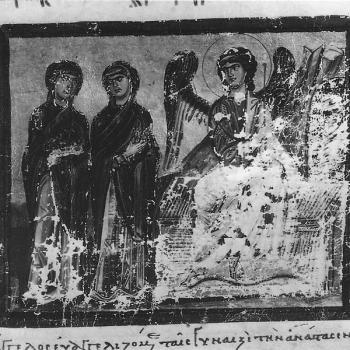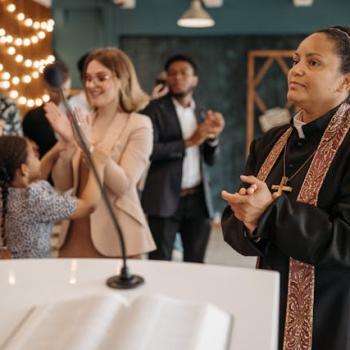When I decided to do this column, I didn’t think I’d use a public media frenzy for a Bible lesson. Hoping to be more instructional – words for leaders, aspiring leaders, those who want to learn about leadership, and help members understand leadership better – it wasn’t my posture to jump on media bandwagon and write about another church disaster witnessed this year. Yet I felt for this one, maybe more than all the others. I felt for it as a leader. It stands as a teachable moment for us. If the headline hasn’t given me away yet, I am referring to the Hillsong Church scandal – and what the church needs to examine in wake of its fall.

The background
If you do a search for “Hillsong Church scandal,” you’ll find numerous headlines. All headlines in the United States ceased around the end of May 2023, when the drama reached a fervor pitch. If we are to be honest, I think the details of what happened at Hillsong are unclear. There are a number of different reports and testimonies. (I can say with certainty that when mess happens, people tend to make things messier. Not every report, nor every testimony, is always accurate.) It appears, from different articles, that different issues were causing the increasingly large empire to crumble on itself, culminating in a few final points. The major accusation was against Hillsong Church Pastor Brian Houston: that he didn’t take appropriate action when a decades old accusation of sexual abuse was made against his father, Frank Houston.
According to reports, Brett Sengstock brought charges of abuse against Pastor Houston’s father in 1999. They were from encounters with Frank Houston in the late 1960s. There is question of what the victim wanted; supposedly, he didn’t want his accusation to go public. Frank Houston later confessed and was forced to resign any position he had with the church; he died in 2002. This opened an entire tribunal against the church and accusations against Brian Houston personally.
The abuse in question never happened at Hillsong Church. It happened decades before Hillsong was a thought. Frank Houston’s actions were also made public by his son, before the church and other sizeable audiences. As of August 24, 2023, he has been cleared of any wrongdoing on this matter.
The media frenzy
The only reason I know of Brian Houston’s exoneration is thanks to a friend of mine in Australia (you can hear a podcast we did together here). There hasn’t been a single word about it in the American media. As I researched for this column, I found only one American report on this issue. Stories of Hillsong Church are buried under salacious accusations that feed our “naughty church” fetish. Everything from Carl Lentz’s public affair, to accusations of racism and drug abuse to two women accusing Pastor Houston of inappropriate texting, things quickly got out of hand. With a church that had its presence in thirty countries and a reputation as the celebrity “cool” church…what happened?
Hillsong Church’s rise
Hillsong Church started in 1983. A favorite of young believers, Hillsong became a megachurch, hosting its first international branch in London in 1992. It came into its heyday in the late 1990s, as its famous worship team (with famous leaders Darlene Zschech, Geoff Bullock, and Reuben Morgan) gained international attention. Darlene’s hit, Shout to the Lord, graced CDs, airwaves, and church services all over the world. Its simple, yet spiritual sentiments struck a chord with a generation longing for something deeper than “church as usual.”
For those who weren’t around or don’t remember, the mid-to-late 1990s were heavy revival-seeking periods in Christian history. There were a number of predictions surrounding a mass revival that would spread worldwide and make the Azusa Street revival, an early Pentecostal movement, look small in comparison. Groups gathered together to pray (including a few churches I belonged to in those days). We believed for revival and longed for it so intensely, we could touch it.
It seemed like our prayers were answered in the Pensacola Outpouring (better known as the Brownsville Revival), the Smithton Outpouring, and the Toronto Blessing. We didn’t think much about what was going on, and years after the fact, we learned things went from a more traditional holiness revival in Pensacola to a wild, strange manifestation in Toronto. As these movements gained mass attention, we missed the point on a few marks. For one, our focus was on three different things: signs, wonders, and numbers. We never considered if these mass movements were creating discipleship or if the signs and wonders that went along with them were valid. That’s because our primary focus was the last point: numbers. The fact that many people flocked to these different things as a sign of interest made us think they were legitimate by default.
An intersection of church and culture
The revivalist mindset of the 90s turned into megachurch culture. Its ideas were popularized in Rick Warren’s The Purpose Driven Church. Underneath its subtext was the idea that bigger is better, whatever the cost. It wasn’t enough anymore for a church to have one building and one campus; one church had to be larger than life, throughout the whole world. While many churches aspired for this, Hillsong Church took the reigns as it grew to include over eighty churches in thirty different countries.
The Hillsong story is an issue of being at the right place at the right time. They’ve always been strong in recognizing their demographic audience and in producing outreach for that audience. Unlike churches that try to be so many things at once that it’s not possible to keep up, Hillsong has maintained its “cool image” with strong worship teams, celebrity attendees, and an overall youthful vibe. They managed churches in multiple countries while the entire world watched. At a point in history where church was still standard and big church was the “now thing,” Hillsong seemed to have it all.
A warning in Hillsong’s downfall
I’ve heard it said “the bigger the church, the harder the fall.” I think it’s more reasonable to say the bigger the church, the harder it becomes to keep it from falling. More importantly, we, as leaders, need to ask the question: is church meant to be as large as Hillsong Church now is? Is it plausible for an overseeing leader – even one with great skills and the ability to travel three quarters of the year – to know what’s going on in eighty churches in thirty countries?
Of recent, I’ve been thinking a lot about the 90s revivals, specifically Brownsville. A tour through old YouTube videos – the music, remembering the times, and most of all, noting the crowds – has caused me to step back and think about the amount of momentum such movements required. All-night prayer services, songwriters, worship teams, nonstop preaching, and building maintenance required dedicated staff to keep coming up with new ideas. From what I understand, Brownsville fizzled out due to internal conflicts. In part, I believe such is the result of the complicated push to keep things going, to keep producing something beyond human capacity.
That’s what happened in the Hillsong Church scandal: they were pushed to produce beyond human capacity. It wasn’t a God-thing anymore; it was a human empire that talked about God. There was no reasonable way the church could continue to expand at its rate and there not be a problem somewhere, at some point. Someone, somewhere was going to make headquarters look bad. Then, under stress and pressure, top leadership starts to crack, too. Eventually, the only way out is down.
Who took care of Brian?
The Hillsong Church scandal is a strong argument in the need for apostolic leadership. Throughout church history, God has endowed people with administrative gifts and abilities to help build and lead the church. If we understand apostolic leadership in the New Testament, the apostles primarily worked (in their ministry discipline) to establish churches and then work with leaders. It was the apostle who installed pastors and elders, communicated important truths to them, and instructed these leaders in doctrinal and interpersonal matters. It seems God recognized something in Biblical times that we don’t today: leaders need leaders, too.
Hillsong Pastor Brian Houston didn’t have that strong presence of apostolic leadership in his work. When things fell apart, the organization relied on elders – not individuals gifted for leading other leaders – for advice. Imagine being in front of the whole world and learning your father was a pedophile. Or the leader of your New York church had an affair. Think about that moment when he first sat down and heard complaints that someone in Boston’s church was racist. These things call not for a leader to have to stand on their own, but a strong leadership representation that is reliable in both confidence and advice.
What happened to Brian Houston – and a number of the other leaders from a moral perspective – is the vast feeling of being a leader, alone. You are worshiped by masses and then go home to be another neglectful spouse, married to your job. When temptation comes knocking, its extremely hard – if not impossible – to walk away from it. Accountability is essential. Such starts with a great leader and a great and supportive leadership team around you. When neither are available, even the best people fall.
Watching our judgment
Before you are quick to say you would do this or that, stop yourself. None of us have any idea what it’s like to lead that many people at one time. We don’t know what it’s like to have so many needs, concerns, committees, and money to govern. Dealing with church people and their numerous conflicts often proves difficult. None of us have had to stand in front of the whole world at any given time when we did something wrong. Most likely, none of us will ever be in a position so high that we will have this experience.
I’m not condoning any wrong done. I wasn’t there; I don’t feel any of us know, without a doubt, what happened. It’s also reality to say that whatever went on in the Hillsong Church scandal also goes on in millions of churches worldwide everyday; the people involved don’t get caught. Plenty of churches turn their heads at the pastor’s affair with the secretary or even the suggestion of pedophiles in their midst (did we all forget about the Roman Catholic Church or the Duggar scandal?). The only reason anyone cares about the Hillsong Church scandal is because it’s a large church, one that plenty of ministers envy for its size and influence. We know how to be critics when it leaves us self-righteous and smug.
The Bible cautions us to stop that attitude because we recognize it could easily be any one of us in the same situation. Remember Ecclesiastes 12:14: For God will bring every deed into judgment, including every hidden thing, whether it is good or evil. (NIV)
Was church meant to be this large?
Can we also deal with the elephant in the room? Church is not meant to be megachurch size. The troupe of the fallen megachurch leader alone should cause us concern. These churches are so big, it’s impossible to foster the necessary relationships involved to create church family. Without relationship, there is no discipleship, nor accountability. What results are massive churches that might produce fantastic atmospheres and great songs, but no true, lasting fellowship.
As mentioned above, these churches don’t meet the needs of their leaders, either. They become huge corporate scenes that draw the extremes of praise and criticism, often without the necessary balance to maintain the work beyond a certain point.
Church was never meant to be “cool”
I respect the overall work of Hillsong throughout the years. They were influential in my own conversion and to this day, I stand behind their overall vision. I also acknowledge that somewhere in time, this became about more than the work of God. It transitioned into a vision of humanity; an earthly idea of what church could be, devoid of the spirituality needed to ground its purpose.
The first church revival started with one church group small enough to fit in one room (Acts 2:1-4). From there, thousands became disciples. The early church followed suit, with believers gathering in homes (Acts 2:46) and then later, in small assemblies.
Church isn’t meant meant to be trendy. It’s not the next big “it” thing. It was meant to be community for people who followed Jesus Christ, as such made them outcasts. The purpose of church is Kingdom-building, trusting that we cannot find what we seek in this world (Philippians 3:20).
I believe the ultimate lesson we learn from the Hillsong Church scandal is that it’s easy to be a critic. It’s much harder for us, when confronted with the world, to opt for heaven. We used to say we shouldn’t become so “heavenly minded that we are no earthly good.” Perhaps these churches, built like empires and then fallen like them as well, remind us that if we are so earthly minded, we are also no heavenly good, either. Our command is still to be the church rather than sit on the sidelines and let megachurches dictate what church ought to be.














